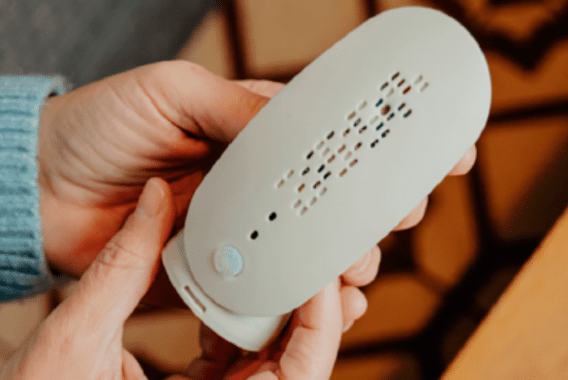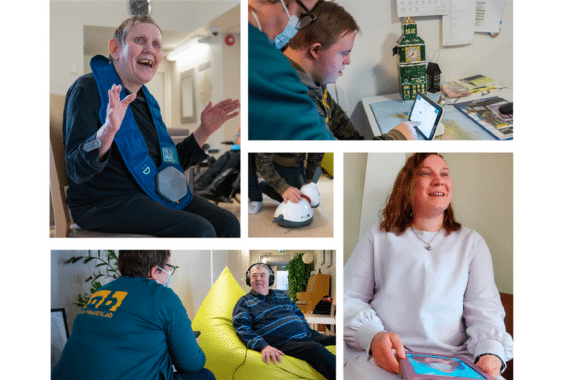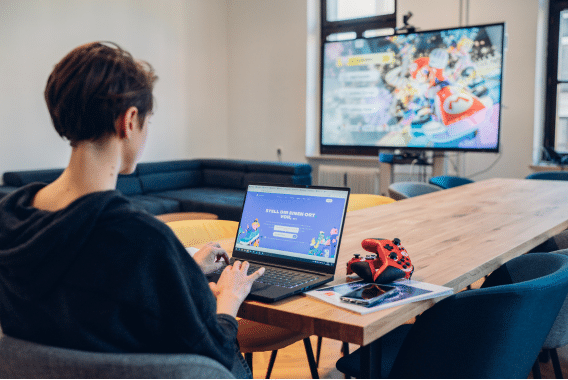Digitalisation and technological tools can play a central role in delivering person-centred care and empowering people. This Award recognises technological and digital improvements that enable social services to provide care that is personalised, coordinated and enabling.
Automating Social Protection for Internally Displaced Persons in Ukraine
Organisation: Ukrainian Ministry of Social Policy and Ministry of Digital Transformation & Medirent
Country: Ukraine

Due to the Russian invasion of Ukraine, the Ukrainian Ministry of Social Policy has a pressing challenge to provide social protection and benefits to many internally displaced persons. To tackle this problem, the Ministry introduced centralisation of appointments, accrual, and payment processes using the Unified Information System of the Social Sphere (UISSS). Medirent, with support from the Ministry and the State Enterprise ‘Information and Computing Centre’, developed and implemented the necessary software for this purpose. The project successfully automated social protection processes, assisting nearly 2.5 million internally displaced persons, easing the workload on social workers, and providing the government with a tool for monitoring and analysing social protection efforts. The project was implemented thanks to the support of the United Nations World Food Programme (WFP UN).
All in One Sensor
Organisation: Barcelona Provincial Council
Country: Spain
Website: https://www.diba.cat/es/web/teleassistencia/que-es-la-teleassistencia

The province of Barcelona faces a pressing care crisis driven by its rapidly ageing population, where nearly 19% of residents are now aged 65 or older. To tackle this challenge, the innovative ‘All in One Sensor’ technology has been developed with a person-centred approach. Its primary function is to identify subtle changes in daily routines, serving as early indicators for various risk situations. Currently, 124 individuals are benefiting from this technology, and the user base is set to expand to 3,900. Encouragingly, the pilot programme evaluation revealed that 73% of users found the sensors comfortable and 60% appreciated their discreet placement. With over 13,000 activities monitored, ‘All in One Sensor’ holds significant promise in enhancing the well-being and safety of Barcelona’s ageing population.
AI-based Solution for Targeted Social Assistance
Organisation: State Social Protection Fund of Azerbaijan
Country: Azerbaijan
Website: www.dsmf.gov.az
This project tackles the challenge of efficiently and proactively distributing Targeted State Social Assistance (TSSA) as a social benefit to low-income families in Azerbaijan, addressing historical administrative and procedural issues. These problems included delays in examinations of household conditions, lack of coordination, and transparency, addressability and equality principle violations, among others, leading to TSSA being denied to qualifying families.
The State Social Protection Fund introduced a web application as an artificial-intelligence-based high-tech product that centralises and streamlines the examination of household conditions, making the process more impartial, efficient, transparent, and cost-effective. By adopting a digital approach, the system, applied for the first time in the world practice in connection with the TSSA assignment, reduced human intervention, minimised corruption risks and bureaucratic inefficiencies, and expedited TSSA assessments, ensuring that those in need receive timely support and have access to resources they need to live a healthy and productive life.
One of the significant achievements of the application was to enable the transition from the “human environment” to the “digital environment”.

Centria HealthLab
Organisation: Centria University of Applied Sciences
Country: Finland
Website: https://centriahealthlab.fi/en/
Centria HealthLab connects social services and healthcare providers, technology companies, research and development, social and health care professionals, non-profit organisations, and end-users to co-develop technology that promotes well-being and independent living. Together with this network, Centria HealthLab’s multidisciplinary team runs rapid trials for technology to support, for example, assisted living and home care, social activation and rehabilitation. The co-creation approach enables workers from social and healthcare field and the persons they support to find the most appropriate technological devices and digital software to support their work and address their needs. To date, more than 100 device trials have been carried out in around 30 different social care units with a wide range of staff and client groups.

DARE: Data for Integrated Care in Catalonia
Organisation: Ministry of Social Rights and Ministry of Health of the Catalan Government
Country: Spain

The Ministry of Social Rights and Ministry of Health of the Catalan Government are integrating its healthcare and social services systems to provide a better response to the needs of an ageing population. Key actions include the creation of the Social and Health Integrated Care Agency, the development of a digital transformation plan, and the implementation of integrated tools and platforms for multidisciplinary care teams. The project aims to improve the quality of life for individuals by considering their needs and preferences in the decision-making process, fostering collaborative practices between the health and social care sectors. Additionally, it focuses on data analysis and AI tools to enhance policy planning and management. An initial evaluation showed a 20% decrease in nursing home admissions in areas where integrated social and health home care had been introduced.
Digital Streetwork Bavaria
Organisation: Bavarian Youth Council
Country: Germany

Digital Streetwork Bavaria engages with young people aged 14-27 on online forums and social media platforms, offering anonymous, confidential, and expert counselling. It focuses on mental health concerns while remaining open to other topics. Streetworkers collaborate with young people, respecting their needs and preferences, and establish connections with local administrations, bridging the digital and analogue worlds. Respecting privacy, Digital Streetwork collects only essential personal information necessary for counselling purposes to create a trusting environment.
By being active online, Digital Streetwork is a new form of outreach that has made a substantial impact. Since its launch in September 2021, engaging over 7,300 young individuals in Bavaria, Germany, in approximately 3,600 counselling sessions. Half of these sessions are intensive, reflecting the need for complex and extended support.
Kujawsko-Pomorskie Telecare
Organisation: Regional Centre for Social Policy in Torun
Country: Poland
Website: https://rops.torun.pl/projekty/kujawsko-pomorska-teleopieka/informacje-o-projekcie
In Poland, there is an increasing trend of older people living alone in single-person households. The Kujawsko-Pomorskie Telecare project focuses on providing telecare services and social assistance to people, especially older, who are dependent, lonely, in need of day-to-day support, ill. Supported individuals receive wrist bracelets equipped with an SOS button, fall detector, GPS location, sensors, heart rate monitoring, and a two-way communication helpline connecting them to a telecentre. The telecentre’s paramedics monitor the devices, respond to notifications, and provide assistance based on individual needs. Additionally, participants can access community-based services such as shopping assistance, meal preparation, and support with household chores. Participants in the projects have reported an improved sense of security and well-being, allowing them to maintain their independence and well-being.

National ICT Services: Providing Quality Client Data for Evidence-Based Social Services
Organisation: Finnish Institute for Health and Welfare
Country: Finland
Website: https://www.kanta.fi/en

Kanta and Sosmeta are integrated digital social welfare services designed to improve access to and the quality of client’s social and health data. Kanta, a national-level system, is a platform for managing up to date personal data and records electronically, such as living conditions and previous service history. Authorised social welfare professionals can access this data on the platform enabling efficient and accurate care and support. Additionally, citizens gain 24/7 access to their own data through MyKanta. Sosmeta, a common data model, ensures the recording of social welfare documentation at regional level is harmonised to create consistent and quality client data accessible to social and health providers. By 2023 more than 90 million documents have been saved in the national client data repository.
